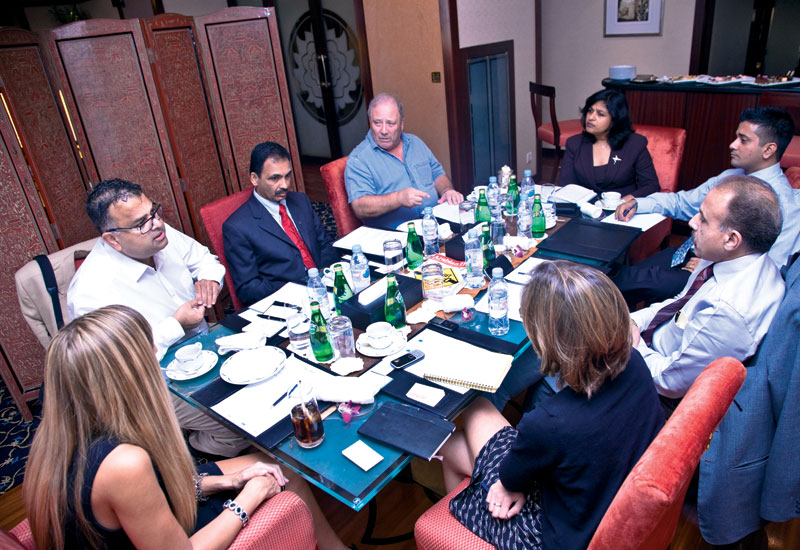 Training providers from EmQuest, TRS Consulting and DTTAG met agents from Orient Travels, DNATA and Kanoo at the debate.
Training providers from EmQuest, TRS Consulting and DTTAG met agents from Orient Travels, DNATA and Kanoo at the debate.
The future of the travel trade depends on investment in its people, so why is the issue of staff training so overlooked? ATN gathered training providers and agents together to discuss why training standards must be improved
For far too long, the issue of training has not been viewed as a priority in the region’s travel trade. But with agents no longer able to rely on airline commissions to make a living, providing a top-notch service is vital to staying competitive; and investment in staff training has never been more important.
Some progress has been made in recent years – thanks to initiatives from the Dubai Travel And Tour Agents Group (DTTAG) – which has put training at the forefront of its agenda, and in partnership with EmQuest and TRS Consulting has rolled out free-of-charge training courses to all its members.
ATN gathered representatives from DTTAG, EmQuest, and TRS Consulting to talk training with agents from Dnata Travel, Orient Travel and Kanoo – at the VIP suite in the Dusit Thani Dubai – and found there’s still a long way to go before industry standards are brought up to scratch.

Advertisement
ATN: In general how would you rate the level of investment in staff training in this region?
Mohsin: The training being done emphasises more on the technical side of things. But customer care and the importance of the customer – those are core issue, and that sort of training is not being provided, which is very, very important if you want to improve the standard of travel services here. That level has to be improved.
The problem at present is that there are so many smaller travel agencies in the market and if you look at the standard of the travel consultant who is sitting behind that desk – they are poor on knowledge. Just by issuing a ticket and making a reservation – you cannot call yourself a travel consultant. When you call yourself a consultant, it means you should have complete and thorough knowledge so that you can advise a customer. But how many travel consultants here possess that knowledge?
Tricia: Anyone can learn how to make a booking and do a ticket, what sets you apart from your competitors is that extra customer service, that skill. And I think in this industry its something we lag behind in.
If you are a doctor, a teacher, a pilot etc you have to get recurrent training all the time. It cannot be ‘one time you’re in and that’s it’– it’s about constantly being re-trained, you have to make sure you take tests. Coming from the US we also had to be consistently trained. We had to do so many programmes and lessons every quarter.
It’s to make sure you know what the latest service is, what the latest markets are doing. You know how to provide that extra step. That in general is one thing that could be more substantial here.
Sundar: If you look at all travel companies in this region, there is a need for that whole mass to come to a higher level. How can you say that we charge professional service fees when the industry itself is not recognised as a professional industry? I mean, I’m not quite sure whether our industry is actually at a par with other service-related companies.
I’m not talking about any one agency here, but the industry collectively. For someone working in a travel outlet in an organisation who would have the need to train, as an industry we are just not offering that. The entire industry has to be a part of the process of change.
Varghese: Are we doing enough training for our travel industry associates? Definitely not. Look at the hotel industry and banking industry, with the training they are conducting – it’s definitely not happening.
ATN: Why is staff training not seen as a priority in the travel sector, as it is in other industries?
Leo: It’s about the margins. We’ve got too many travel agencies for the market to support, and since the commissions disappeared they don’t know how to maintain income. You still can’t get agencies to move away from the old idea of “I’ll do it for less”. It runs through the trade.
Varghese: Many travel companies are not conducting training, because remuneration in the travel sector as we all know is very, very small and training is an expensive affair. At many of the travel agencies your net retention may be less than one%, so I don’t blame the owners for not conducting expensive training. But we need to educate the travel trade, including the owners, that it’s good for you to invest in your people.
Mohsin: Unfortunately the travel industry here at the lower level is a very poor pay master. This is a white collar job, but it’s blue collar pay because the staff are paid so very little. They have to be dressed immaculately, but at the end of the month get paid peanuts. Any training will cost you a lot – a minimum of AED1,500. Now as a travel consultant who is earning AED3,000 do you think he will shell out AED1,500? You can’t expect people to pay.
Sundar: The issue here is not about people not being aware of the need to invest in their staff. There is no denial there is a need for training and we need to do it, however I think the issue is that need is not being seen as critical for their success factor. Because if that were the case, as a trainer provider I would probably be a lot more busy!








 Search our database of more than 2,700 industry companies
Search our database of more than 2,700 industry companies









